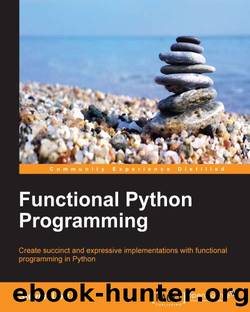Functional Python Programming by Lott Steven;

Author:Lott, Steven;
Language: eng
Format: epub
Publisher: Packt Publishing
Finally, we chained all of the readers into a single iterator with chain(*readers). This was used to yield the sequence of rows from all of the files.
It's important to note that we can't return the chain(*readers) object. If we do, this would exit the with statement context, closing all the source files. Instead, we must yield individual rows so that the with statement context is kept active.
Partitioning an iterator with groupby()
We can use the groupby() function to partition an iterator into smaller iterators. This works by evaluating the given key() function for each item in the given iterable. If the key value matches the previous item's key, the two items are part of the same partition. If the key does not match the previous item's key, the previous partition is ended and a new partition is started.
The output from the groupby() function is a sequence of two tuples. Each tuple has the group's key value and an iterable over the items in the group. Each group's iterator can be preserved as a tuple or processed to reduce it to some summary value. Because of the way the group iterators are created, they can't be preserved.
In the Running totals with accumulate() section, earlier in the chapter, we showed how to compute quartile values for an input sequence.
Given the trip variable with the raw data and the quartile variable with the quartile assignments, we can group the data using the following commands:
group_iter= groupby(zip(quartile, trip), key=lambda q_raw: q_raw[0]) for group_key, group_iter in group_iter: print(group_key, tuple(group_iter))
Download
This site does not store any files on its server. We only index and link to content provided by other sites. Please contact the content providers to delete copyright contents if any and email us, we'll remove relevant links or contents immediately.
| Coding Theory | Localization |
| Logic | Object-Oriented Design |
| Performance Optimization | Quality Control |
| Reengineering | Robohelp |
| Software Development | Software Reuse |
| Structured Design | Testing |
| Tools | UML |
The Mikado Method by Ola Ellnestam Daniel Brolund(23444)
Hello! Python by Anthony Briggs(22581)
Secrets of the JavaScript Ninja by John Resig Bear Bibeault(21377)
Kotlin in Action by Dmitry Jemerov(20427)
Dependency Injection in .NET by Mark Seemann(20380)
The Well-Grounded Java Developer by Benjamin J. Evans Martijn Verburg(20264)
OCA Java SE 8 Programmer I Certification Guide by Mala Gupta(19442)
Algorithms of the Intelligent Web by Haralambos Marmanis;Dmitry Babenko(18251)
Grails in Action by Glen Smith Peter Ledbrook(17374)
Adobe Camera Raw For Digital Photographers Only by Rob Sheppard(16973)
Test-Driven iOS Development with Swift 4 by Dominik Hauser(11207)
Becoming a Dynamics 365 Finance and Supply Chain Solution Architect by Brent Dawson(8071)
Microservices with Go by Alexander Shuiskov(7841)
Practical Design Patterns for Java Developers by Miroslav Wengner(7738)
Test Automation Engineering Handbook by Manikandan Sambamurthy(7699)
Angular Projects - Third Edition by Aristeidis Bampakos(7182)
The Art of Crafting User Stories by The Art of Crafting User Stories(6639)
NetSuite for Consultants - Second Edition by Peter Ries(6558)
Demystifying Cryptography with OpenSSL 3.0 by Alexei Khlebnikov(6324)
